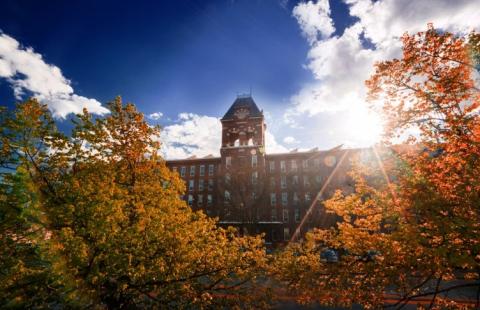We are not admitting students to the Humanities program at this time.
What is humanities?
The humanities discipline questions the fundamentals of existence, examining the human experience through society and culture. From Greek tragedies to postmodern novels to Renaissance sculpture, the humanities explores the cultural, social and behavioral theories, and experiences that influence the human condition.
Why study humanities at UNH Manchester?
Through self-designed concentrations and faculty mentorship, UNH Manchester’s highly interdisciplinary humanities program develops the intellectual, analytical and communication skills that will set you apart in any industry. As a humanities major, you’ll sharpen your abilities in analysis and critical thinking through exploration of diverse works of art, music, literature, history, philosophy and the sciences. Let your interests fuel your studies with self-designed concentrations, from the social and ethical implications of genetic engineering to the examination of a historical period through literature, arts and more.
Potential careers
- Advertising, promotions or marketing manager
- Archivist
- Curator
- Historian
- History teacher or professor
- Human resources specialist
- Museum worker
- Paralegal or legal assistant
Massachusetts does not offer a bachelor's-level humanities program in their public universities, so students from Massachusetts pay a reduced tuition rate through the New England Regional Student Program.
Curriculum & Requirements
The UNH Manchester Humanities program focuses on the world’s great cultures and how humans interact with the world. Students take an interdisciplinary approach in studying works from an array of regions and time periods, exploring how cultural productions emerge from a rich social environment. Drawing from history, literature, art, philosophy, politics, and the sciences, the Humanities program not only provides foundational skills in the true liberal arts tradition but also gives students the flexibility to design a program of study keyed to their own interests.
The program attracts highly motivated students who wish to assume significant responsibility for the content and direction of their studies. Individually designed programs may cover the full range of student interests: for example, the social and ethical implications of genetic engineering or the examination of a historical period through study of its literature, arts, history, philosophy, and sciences. Humanities students develop skills of analysis, critical assessment, and effective communication, completing their major with two capstone seminars. The first seminar, explores the nature of creativity through the lives and works of individuals such as Leonardo da Vinci, Kathe Kollwitz, Mozart, Freud, Einstein, and Georgia O'Keeffe. The second seminar, explores current social and political issues with a focus on developments in public policy, science, and business, and their impact on social values.
A Humanities major or minor can complement work in other majors such as English Teaching, Business, Communication Arts, Psychology, or Computing Information Systems. Humanities majors find employment in a wide range of fields or pursue graduate study in subjects such as law or education. The skills and knowledge developed through the major are important in virtually all social and career responsibilities.
For more information, contact Phillip Deen, program coordinator or the UNH Manchester Office of Admissions at (603) 641-4150.
This degree plan is a sample and does not reflect the impact of transfer credit or current course offerings. UNH Manchester undergraduate students will develop individual academic plans with their professional advisor during the first year at UNH.
Sample Course Sequence
| First Year | ||
|---|---|---|
| Fall | Credits | |
| UMST 401 or UMST 402 | First Year Seminar or Transfer Seminar | 1-2 |
| ENGL 401 | First-Year Writing | 4 |
| Elective | 4 | |
| Elective | 4 | |
| Discovery Course | 4 | |
| Credits | 17-18 | |
| Spring | ||
| Quantative Reasoning | 4 | |
| HUMA 411 | Humanities I | 4 |
| Discovery Course | 4 | |
| Elective | 4 | |
| Credits | 16 | |
| Second Year | ||
| Fall | ||
| Foreign Language | 4 | |
| HUMA 412 | Humanities II | 4 |
| ENGL 419 | How to Read Anything | 4 |
| Discovery Course | 4 | |
| Credits | 16 | |
| Spring | ||
| Foreign Language | 4 | |
| Major Concentration | 4 | |
| Elective | 4 | |
| Discovery Course | 4 | |
| Credits | 16 | |
| Third Year | ||
| Fall | ||
| Major Concentration | 4 | |
| Discovery Course | 4 | |
| Elective | 4 | |
| Elective | 4 | |
| Credits | 16 | |
| Spring | ||
| Major Concentration | 4 | |
| Discovery Course | 4 | |
| Elective | 4 | |
| Elective | 4 | |
| Credits | 16 | |
| Fourth Year | ||
| Fall | ||
| Major Concentration | 4 | |
| HUMA #795 | Study of Creativity | 4 |
| Discovery Course | 4 | |
| Elective | 4 | |
| Credits | 16 | |
| Spring | ||
| Major Concentration | 4 | |
| HUMA #796 | Study of Contemporary Issues | 4 |
| Discovery course | 4 | |
| Elective | 4 | |
| Credits | 16 | |
| Total Credits | 129-130 | |
Degree Requirements
All Major, Option and Elective Requirements as indicated.
*Major GPA requirements as indicated.
Major Requirements
For the Humanities major at UNH Manchester, students must complete a minimum of 128 credits and satisfy the University's Discovery Program and foreign language requirements, and students must complete 40 credits with a minimum grade of C in each course in the major.
| Code | Title | Credits |
|---|---|---|
| Core Courses | ||
| HIST 500 | Introduction to Historical Thinking | 4 |
| or ENGL 419 | How to Read Anything | |
| HUMA 411 | Humanities I | 4 |
| HUMA 412 | Humanities II | 4 |
| Self-Designed Concentration 1 | 20 | |
| Capstone Seminar Courses | ||
| HUMA #795 | Study of Creativity | 4 |
| HUMA #796 | Study of Contemporary Issues | 4 |
| Total Credits | 40 | |
- 1
This is an approved program of study designed by the student in consultation with a faculty advisor. In addition to courses available on the Manchester campus, students may, with prior approval, use courses from area colleges and the University's Durham campus. The concentration is made up of five courses from any relevant discipline (ENGL, CLAS, PHIL, HIST, etc.) with at least two at the 600 or 700 level.
Students will be able to:
- Think critically, and across disciplines, in analyzing and comparing works produced within given cultures or historical periods.
- Conduct and present multidisciplinary research in written, oral, or other forms.
- Identify and evaluate primary and secondary sources appropriate for research within the humanities.
Explore Program Details
The Bureau of Labor Statistics projects positive growth in many careers that demand sharp skills in critical thinking, analytical and communication — skills that are central to the humanities program.
Your humanities degree will open doors to careers in industries from business to technology to arts and beyond, or prepare you for graduate studies in law, education and more. Whatever you hope to achieve after graduation, you’ll be armed with the skills and experience for a bright future.
| Job Title | Job Growth | Average Salary |
| Advertising, Promotions or Marketing Manager | 9% | $124,850 |
| Archivist, Curator or Museum Worker | 7% | $46,710 |
| High School Teacher | 6% | $57,200 |
| Historian | 2% | $55,800 |
| History Teacher, Postsecondary | 13% | $72,470 |
| Human Resources Specialist | 5% | $58,350 |
| Middle School Teacher | 6% | $55,860 |
| Paralegal or Legal Assistant | 8% | $48,810 |
Our campus is in the heart of the region’s cultural, economic, entertainment and government activity — putting unlimited internship opportunities at your doorstep. We’ve partnered with local businesses to give you the real-world experience that sets you apart.
“Rather than thinking of education in a vacuum, as something to prepare you for something else after graduation, the internship actually bridges education with career.”
Jack Resch, Program Coordinator and Professor of Humanities
Humanities majors have interned at many high-profile organizations in the area, including:
- Franco-American Centre
- Green Alliance
- Manchester Historic Association
- Mariposa Museum of World Cultures
- New Hampshire Historical Society
Add a breadth of perspective to your degree with a humanities minor, giving you a foundational understanding of the human condition through art, music, history, literature and more.
Complement any degree with a philosophy minor, giving you the analytical, interpretive and critical reasoning skills that employers in any industry look for.







